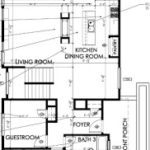The CRM Framework
 Once you have a solid CRM foundation to build upon, it’s time to begin building out the CRM framework for your system. Of course, the building blocks for every CRM are the contacts, including both people and companies.
Once you have a solid CRM foundation to build upon, it’s time to begin building out the CRM framework for your system. Of course, the building blocks for every CRM are the contacts, including both people and companies.
CRM Contact “Building Blocks”
There are a number of considerations you need to think about related to your CRM contacts:
- Where is the information now?
- How much of the information should be moved into CRM?
- Will additional fields or notes be needed to capture information related to contacts?
- How will the contacts be related to each other or to entities?
- How should contacts be categorized and segmented?
Make Room for Growth in Your CRM Framework
Next, it’s important to make sure that you have enough room in your system for growth. Think about any other types of information that may need to be housed in the system — now or in the future. Consider the various additional CRM sections or modules you might want. Considerations include:
- What are all the details that will be important?
- Will you gather and track information related to eMarketing campaigns and events?
- Will a bridge need to be built to allow information from the eMarketing and event management system to live in the CRM?
- How will communication preferences such as opt-ins and -outs be facilitated?
- How will bounced e-mails be handled?
- How will RSVPs and campaign analytics be tracked?
- Will activities need to be created for certain types of interactions or transactions and associated with records?
Communication, Coordination, Client Service & Business Development
A final important hall to go down during the CRM framing process involves considering the ways a CRM system can become a doorway to improved communication, coordination, client service and business development. For instance:
- Should opportunities, pitches and proposals be entered and tracked? If so, what information will be relevant?
- Will referrals need to be tracked?
- What details will be important?
- What types of relationships will need to be built and leveraged?
- What types of searches, views, reports or dashboards will need to be built to help get actionable information out of the system?
The Finishing Nails: People
One of the most important considerations during the framing stage is, what will hold everything together. When it comes to CRM, there is no substitute for good, dedicated and well-trained people. The end users are the ones who will ultimately determine whether the CRM system is strong enough to stand up to the elements– by actually using it. To enhance system adoption, they have to understand and appreciate the value of the system for the firm, and for themselves.





Write a comment: